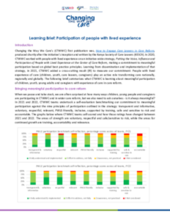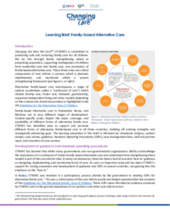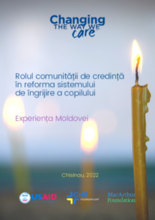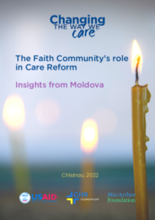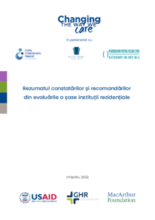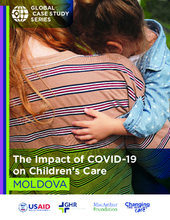This country page features an interactive, icon-based data dashboard providing a national-level overview of the status of children’s care and care reform efforts (a “Country Care Snapshot”), along with a list of resources and organizations in the country.
demographic_data
childrens_living_arrangement
children_living_without_bio
adoption
social_work_force
key_stakeholders
Key Stakeholders
Add New DataOther Relevant Reforms
Add New Datadrivers_of_institutionalisation
Drivers of Institutionaliziation
Add New Datakey_research_and_information
Key Data Sources
Add New DataDevelopment of Integrated Social Care Services for Vulnerable Families and Children at Risk in Moldova
Care Reform Workshop Report
Acknowledgements
Data for this country care snapshot was contributed by partners at Lumos and Changing the Way We Care.
Displaying 61 - 70 of 215
This learning brief was developed as part of the CTWWC 2022 annual report and shares learning from Kenya, Guatemala and Moldova. It is intended to help other practitioners understand how to bring meaningful participation of people with lived experience into care reform. By people with lived experience CTWWC considers children and youth, care leavers, parents and other care givers who are experiencing the care system in their context.
This learning brief was developed as part of Changing the Way We Care's 2022 annual report and shares learning on family-based alternative care from Guatemala, Moldova, India and Kenya and links the reader to additional CTWWC resources on the topic.
The Child Protection Technical Advisor will provide technical expertise and guidance to CTWWC to ensure the delivery of high-quality child protection programming in Moldova. In coordination with the global technical advisors, the Child Protection Technical Advisor will support the advancing key strategic objectives in Moldova aimed at moving the care system towards one that prioritizes, resources and promotes safe and nurturing family care.
În primăvara anului 2021, programul Changing the Way We Care (CTWWC) a lansat un sondaj pentru a studia comunitatea de credință din Moldova și implicarea acesteia în reforma sistemului de îngrijire a copiilor. Scopul acestui sondaj a fost de a înțelege mai bine angajamentul actual și potențial al organizațiilor și liderilor de credință în calitate de persoane de influență și furnizori de servicii, dar și de a identifica orice obstacole în calea implicării acestora în reforma respectivă.
This report details Changing the Way We Care's enquiry into the faith-based community in Moldova and its involvement in the ongoing reform of care for vulnerable children.
În 2021-2022, CTWWC în parteneriat cu trei organizații ale societății civile: Keystone Moldova, Copil, Comunitate, Familie (CCF Moldova) și Asociația Parteneriate pentru Fiecare Copil (P4EC), a realizat o serie de cercetări la nivel național, inclusiv evaluarea complexă a șase instituții rezidențiale (IR).
During 2021-2022, Changing the Way We Care in partnership with three civil society institutions: Keystone Moldova, Child, Community and Family (CCF Moldova) and Partnerships for Every Child (P4EC), conducted a series of assessments on the national level, including a complex evaluation of six residential institutions (RI).
This case study is part of a series of case studies conducted in India, Kenya, Moldova and Uganda over the course of 2020-2022 to share information on how COVID-19 has and is affecting family-child reunification, alternative care placement, and offers recommendations for family- and community-based care of vulnerable children in the context of COVID-19 and future emergencies.
In 2021 and 2023 Changing the Way We Care (CTWWC) completed a household survey of children and caregivers, in demonstration countries Guatemala, Kenya and Moldova, to understand their experience of CTWWC services, the protective factors in their families, and the status of child well-being. Part of CTWWC’s evaluations, the resulting findings are designed to help CTWWC and other care reform actors to understand the successes and challenges of reintegration from residential care and the provision of family strengthening support.
On 1st of June 2022, the Ministry of Labour and Social Protection of the Republic of Moldova officially presented the National Program for Child Protection 2022-2026. The document sets out the objectives and priority actions for the next five years, which aim to strengthen the social protection system of children in the Republic of Moldova, in order to respond promptly and effectively to the needs of each child.

